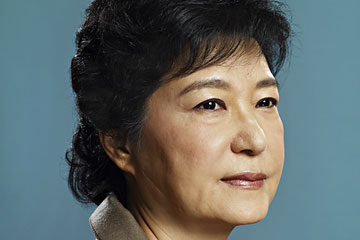
"I know how fleeting and, at times, harrowing political power can be," says Park Geun-hye
It's a chilly November evening in the South Korean city of Kwangju, and a middle-aged group is waiting at the train station for 60-year-old presidential contender Park Geun-hye. Suddenly, the unmistakable riff of "Gangnam Style" throbs through the twilight. Wearing the crimson of Park's ruling Saenuri Party, four young women in short shorts bound across the platform. As they perform the song's distinctive riding and lassoing dance, many in the crowd look stunned, as if they have never seen the most watched video on YouTube or heard the tune that has become globally synonymous with South Korea.
Park's conservative supporters seem out of sync with the young and irreverent South Korea that "Gangnam Style" reflects. Frankly, so does Park. On the hustings, while she bows politely and shakes hands with well-wishers, she comes across as earnest and stoic--cold, say her critics, who call her the "ice queen."
Park should be comfortable with people. As the eldest child of Park Chung-hee, the strongman who ruled South Korea for 18 years, she has long been in the public eye. And polls have her holding a narrow but stubborn lead over her main rival, 59-year-old human-rights lawyer Moon Jae-in from the left-leaning, opposition Democratic United Party. Park seems aware that she needs to jazz up her image--to get some Gangnam style of her own. In Kwangju she starts her speech with an entreaty: "Help me start a new era."
South Korea will start a new era in at least one respect should Park win the Dec. 19 election. A Park presidency would be the first time a woman has occupied the highest office in the country, which lags far behind many of its Western counterparts in gender equity. Park is also trying to change her party, which is identified with the authoritarian past. Park wants to recast the Saenuri Party as more populist. In recent weeks she has vowed to stick up for small-business owners and low-income families. Some think she is pandering to get elected, but Park vows her commitment is real. In a written response to Time, she says, "If a politician makes a promise, it should be kept."
The Burden of History
In the 1960s, Park's father pioneered one of history's great economic expansions, favoring industries that could export the country out of poverty. The model was adopted by other so-called Asian tigers, leading to the region's economic miracle. Today South Korea is the world's 11th biggest economy. Its politics are vigorous, as are its top companies, which have a global footprint. When it comes to soft power--from Samsung phones to glossy K-pop--South Korea has supplanted Japan as East Asia's leading force.
But South Korea also has entrenched problems, both geopolitical and domestic. It's bordered by rogue state North Korea, old adversary Japan and, of course, China, a big market but also a big rival for resources and influence. Internally, South Korea's slowing economy needs to be weaned off its overreliance on a handful of conglomerates whose businesses feed one another.
Then there's Park's background. While her father, a general who seized power in a 1961 coup, is revered by many South Koreans, he is despised by others for his flagrant abuses of power. To be a unifying figure, Park will have to overcome her history, which is complex.
